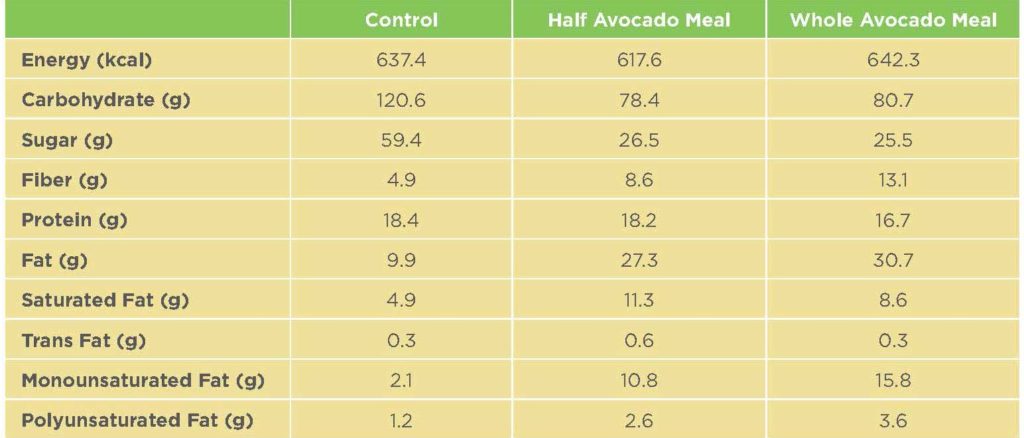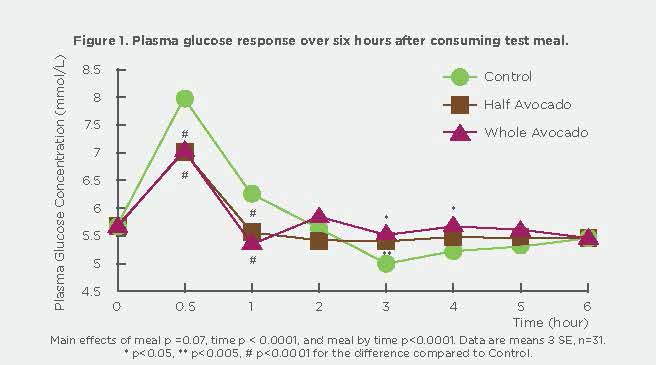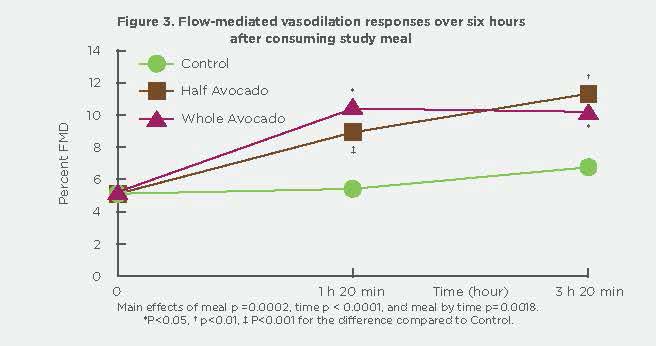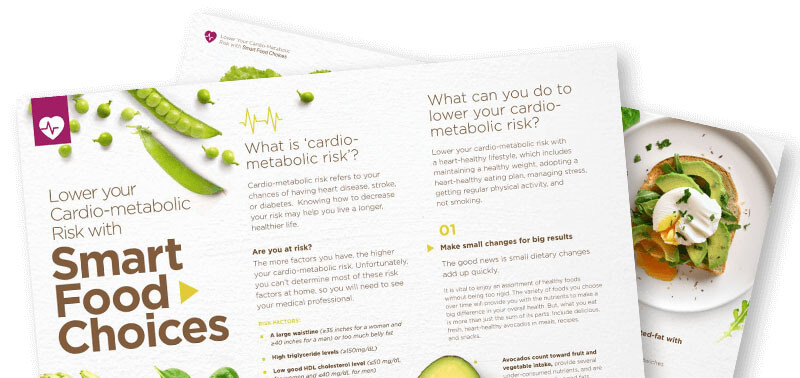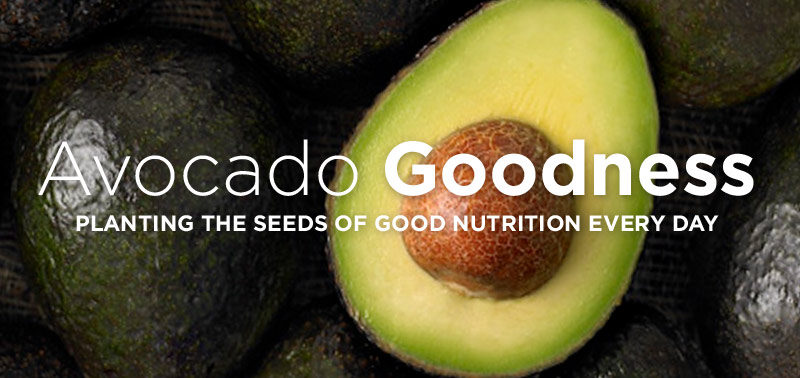Study Overview
The study was published in the journal, Nutrients,1 and was funded by the Hass Avocado Board. The randomized, controlled, three-arm, six-hour postprandial, cross-over study examined the effects of replacing carbohydrate energy in meals with a half or whole avocado on markers of metabolic and vascular health in 31 participants.
Researchers found that compared to the energy-matched, low-fat, high-carbohydrate, control (CON) meal, overweight adults who consumed an avocado as part of a breakfast meal showed improved flow mediated dilation, a marker of endothelial function, and improved glycemic and lipoprotein profiles. Conclusions cannot be generalized to all populations, over longer time periods, or about other quantities of avocado.
Published: September 2018, Nutrients
Study funded by Hass Avocado Board
Category: Cardiovascular Health, Type 2 Diabetes
Download Scientific Summary PDF
See Published Study
Key Takeaways
Consumption of one-half or a whole avocado in a breakfast meal significantly:
- Decreased the postprandial glycemic and insulinemic responses (total area under the curve and peak concentration at 30 minutes) compared to a low-fat control meal (total area under the curve).
- Improved acute endothelial function as measured by flow mediated vasodilation compared to the low-fat control meal, despite elevated triglyceride concentrations.
Consumption of an avocado-containing meal reduced peak postprandial glucose levels below the threshold set for arterial risk by the European Diabetes Policy Group (7.5 mmol/L).

Conclusions
Researchers concluded that eating a meal containing one-half or a whole avocado compared to an isocaloric, low-fat, high-carbohydrate meal may improve acute markers of heart health in middle-aged, overweight/obese adults. The findings in this study align with a growing body of evidence supporting avocados as heart-healthy.

Study Design & Details
The study was designed as an acute randomized, cross-over, single-blinded, controlled trial to test the effects of including half an avocado or a whole avocado in a breakfast meal compared to a control meal with the same number of calories. Each participant consumed each of the three meals, in random sequence, on separate occasions.
The advantage of this design is that each participant served as his/her own control thus significantly reducing between-participant variability. Sample size was determined using power analysis based upon previous studies to ensure enough participants were included to draw significant conclusions. The meals and nutrient composition are described in tables 1 and 2.

- Overweight/obese (BMI 29.0 2.4 kg/m2), male and female participants (37.9 10.3 years) were coached to restrict intake of avocados, brightly colored plant foods, alcohol, caffeine-containing foods and beverages for three days prior to each test day and limit physical activity for 24 hours prior to each visit.
- A controlled dinner meal was provided to standardize all participants prior to start of the study the next morning. Participants fasted overnight. At baseline, participant mean fasting blood glucose was 100.4 7.0 mg dL and mean fasting insulin was 8.7 3.0 uIU/mL.
- People with unusual dietary habits, who were actively trying to lose weight, addicted to drugs or alcohol, or who smoked or were taking over the counter supplements or prescription medications were excluded from the trial. Anyone who consumed three or more servings of nuts per week was also excluded.
- 31 participants (15 men and 16 women) completed the study.
- Blood was collected for six hours post-breakfast during which time no other food was eaten. Flow mediated dilation (FMD) was measured at 1 hour 20 minutes and 3 hours 20 minutes. FMD is a commonly used clinical research method to assess noninvasive endothelial function. This sensitive test evaluates arterial endothelial dysfunction, a key early event in atherogenesis.
Results
Lipoproteins concentrations were only measured after the whole avocado and control meals. The whole avocado meal significantly reduced total chylomicron and VLDL-C concentrations. The concentration of different sizes of circulating particles also differed by meal. Lipoprotein levels in response to the meals were differentially affected by race/ethnicity. There were no significant effects of the meals on inflammatory and oxidative stress markers.

Avocados and Cardiometabolic Health
Based on these findings, researchers concluded that eating a meal containing one-half or a whole avocado compared to an isocaloric, low-fat, high-carbohydrate meal may improve acute markers of heart health in middle-aged, overweight/obese adults. The findings in this study align with a growing body of evidence, supporting avocados as heart healthy.
This study included a half an avocado or one whole avocado in the breakfast meals; more research is needed to determine whether the results could be replicated with consumption of a single serving, one-third of a Hass Avocado. Conclusions drawn are from one single-meal study that cannot be generalized to all populations. There is a need to further understand the race/ethnic disparity in diet therapy and how results might vary. The study design does not allow for making conclusions about long-term effects, which will require additional studies.

Hass Avocado Board Supports Nutrition Research
The Hass Avocado Board (HAB) is a promotion, research and information organization under supervision of the United States Department of Agriculture. HAB has a science research pipeline of ongoing clinical studies investigating the relationship between fresh avocado consumption and weight management and risk factors for cardiovascular disease and diabetes. And, based on their nutrition and phytochemical components, emerging research suggests that avocados may play benefit many emerging areas, including skin, eye, joint and cellular health.
1. Park E, Edirisinghe I and Burton-Freeman B. Avocado Fruit on Postprandial Markers of Cardio-Metabolic Risk: A Randomized Controlled Dose Response Trial in Overweight and Obese Men and Women. Nutrients 2018, 10(9), 1287.




